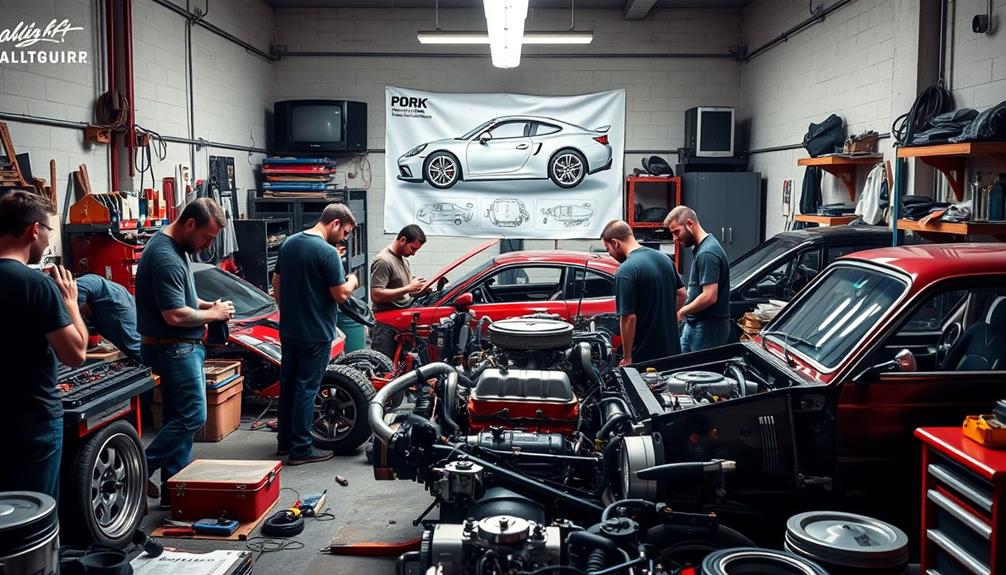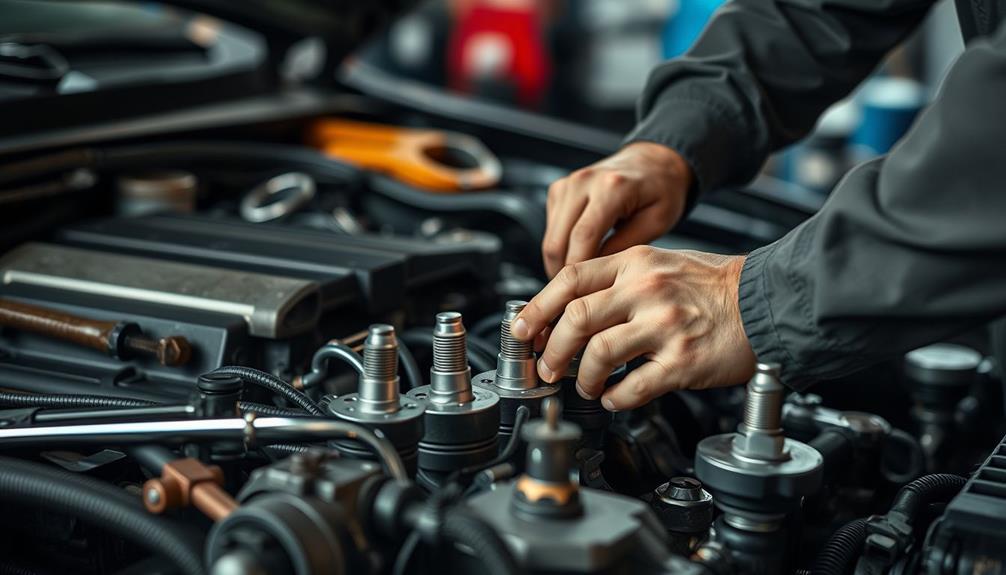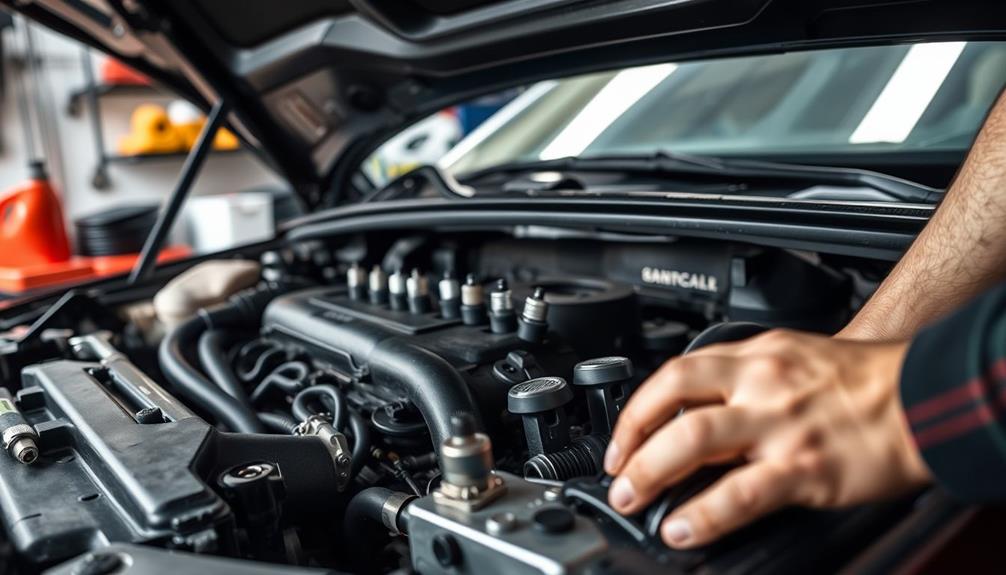Getting into car tuning is exciting, and it starts with passion and hands-on experience. Begin by working on your own vehicle or volunteering at a local tuning shop to gain practical skills. Join car clubs and attend events to network with experienced tuners who can guide you. Continuously educate yourself through online courses and automotive literature to enhance your knowledge. As you build a portfolio and reputation, consider establishing your own tuning business. Remember, understanding legal aspects and safety regulations is vital. There's a lot more to explore about advancing your tuning career, so keep going! If you are dedicated and passionate about car tuning, then pursuing a career in car tuning can be a fulfilling and rewarding path to take. By continuously honing your skills and staying updated on the latest technologies and trends, you can position yourself as a reputable and sought-after tuner in the industry. Remember, a successful career in car tuning requires dedication, hard work, and a commitment to delivering top-notch results for your clients. Keep pushing forward and never stop learning, as the world of car tuning is constantly evolving.
Key Takeaways
- Gain hands-on experience by working on low-powered vehicles and volunteering at tuning shops to develop practical skills.
- Attend local automotive events and join car clubs to build a professional network and share tuning projects.
- Continuously learn through online courses, books, and workshops to enhance your theoretical understanding and stay current in the field.
- Start small by offering tuning services to friends or local enthusiasts, building a portfolio of completed projects.
- Understand and comply with legal regulations regarding vehicle modifications to avoid penalties and ensure roadworthiness.
Overview of Car Tuning
Car tuning is often a thrilling venture for enthusiasts looking to enhance their vehicle's performance and aesthetics. It involves making modifications that can markedly improve your ride's handling, speed, and appearance.
When diving into car tuning, you'll encounter various categories, including engine tuning and suspension tuning.
Engine tuning focuses on optimizing your vehicle's power and efficiency. Techniques like turbocharging, chip tuning, and boost pressure adjustments allow you to access your engine's full potential.
If you're keen on improving your car's handling and stance, suspension tuning is where you should direct your attention. By lowering your vehicle or upgrading to sports suspensions and adjustable coilovers, you can enhance both performance and visual appeal.
While the excitement of tuning is undeniable, remember that legal compliance is essential. Many modifications may require parts certificates, and some changes could be illegal on public roads.
If you're serious about car tuning, consider collaborating with a professional tuner who can guide you through the process and guarantee your modifications are both effective and lawful.
Engaging in car tuning opens a world of possibilities for your vehicle, making it truly unique to you.
Importance of Practical Experience
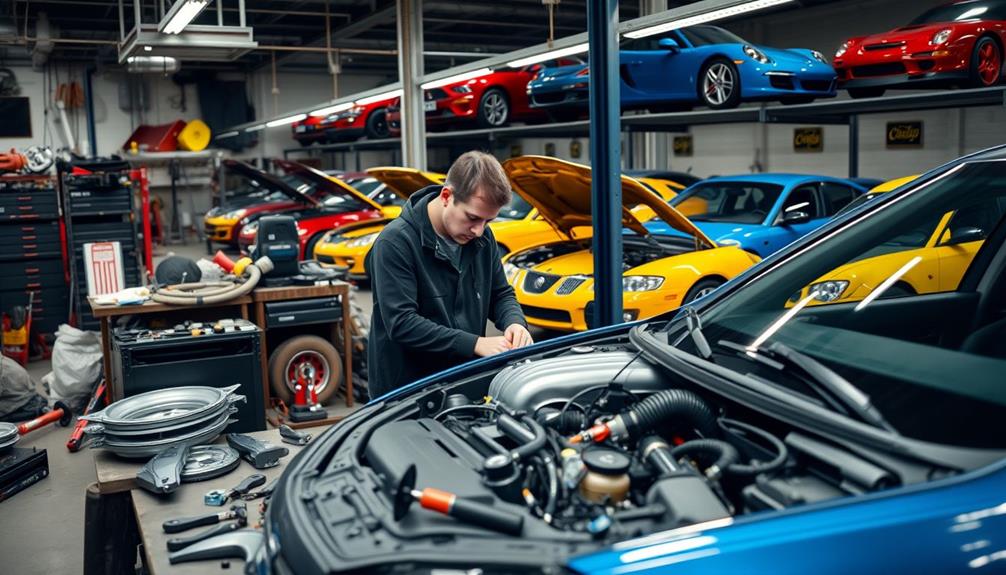
Gaining practical experience in car tuning is essential for honing your skills and applying what you've learned.
Working hands-on with vehicles not only helps you understand real-world dynamics but also opens up valuable networking opportunities in the industry.
Hands-on Skill Development
When it comes to mastering car tuning, nothing beats the value of hands-on experience. Engaging in hands-on projects, even with low-powered vehicles, is essential for developing practical tuning skills and understanding vehicle dynamics. You'll find that working or volunteering at local tuning shops allows you to gain real-world experience and learn from seasoned professionals.
Here's a quick overview of how to enhance your hands-on skill development:
| Action | Benefits | Resources |
|---|---|---|
| Participate in hands-on projects | Develop practical skills | Local car clubs, community events |
| Volunteer at tuning shops | Learn from experienced tuners | Local tuning shops |
| Enroll in specialized courses | Gain structured knowledge | Online courses, workshops |
| Network with enthusiasts | Collaborate on projects | Social media, local meets |
Practical experience reinforces theoretical knowledge, making it essential to apply tuning principles in real scenarios. Networking with local car clubs and enthusiasts provides opportunities for collaborative projects, enhancing your practical skills and fostering community support. Remember, continuous learning through specialized courses and hands-on experience is critical for mastering the complexities of car tuning.
Real-World Application
Hands-on experience isn't just beneficial; it's essential for anyone serious about mastering car tuning. Engaging in practical projects, like tuning low-powered vehicles, allows you to apply your theoretical knowledge while developing the hands-on skills vital for success.
Volunteering or working part-time at local tuning shops can provide invaluable real-world application, exposing you to industry standards and best practices.
Participating in community car clubs offers another fantastic avenue. You can tune vehicles for friends and fellow enthusiasts, building a portfolio and gaining practical feedback from knowledgeable people. This collaborative environment fosters continuous learning, as you absorb insights from those who've been in the game longer than you.
Online courses are great for expanding your theoretical knowledge, but nothing solidifies your understanding quite like putting those principles into practice. The more you engage in real-world application, the more your tuning expertise will grow.
Networking Opportunities
Networking is a powerful tool in the car tuning world, and practical experience can greatly enhance your connections. By immersing yourself in local racetracks and automotive events, you can meet experienced tuners who might offer mentorship or job opportunities.
These interactions can help you understand the industry better and expand your network considerably.
Joining car clubs and online forums dedicated to tuning is another great way to tap into networking opportunities. Here, you can exchange tips, resources, and even collaborate on projects with fellow enthusiasts.
Offering free assistance or services at established tuning workshops not only highlights your skills but also builds your credibility and relationships in the industry.
Attending tuning workshops and seminars further boosts your knowledge while connecting you with industry professionals. You'll learn about current trends and meet potential collaborators.
Ultimately, participating in local tuning events increases your visibility in the community, which could lead to referrals from other tuners and potential clients.
Educational Resources for Tuners
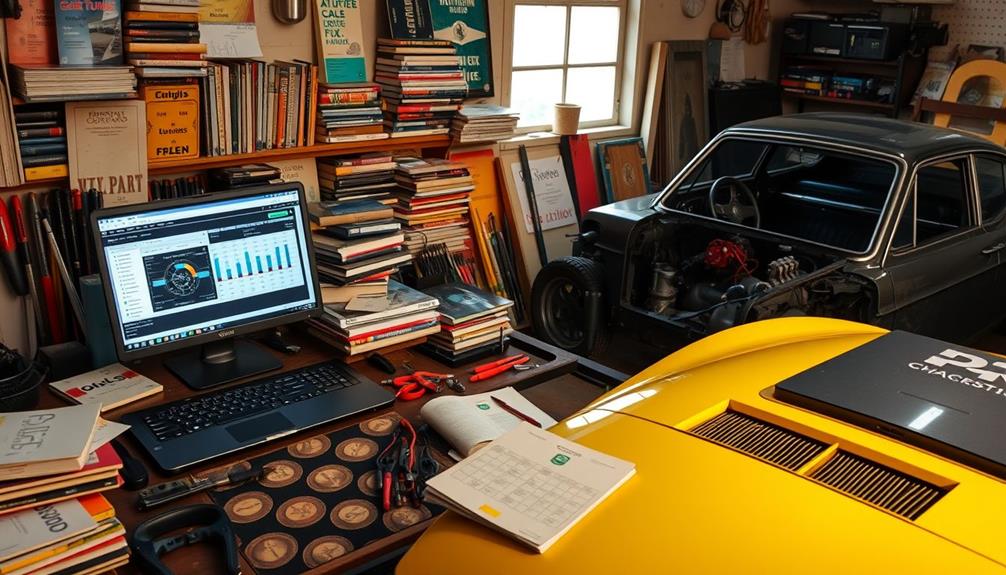
The world of car tuning offers a wealth of educational resources that can kickstart your journey as a tuner. Online courses and one-on-one lessons are primary sources of knowledge, helping over 30,000 individuals successfully shift into tuning careers. These structured programs provide foundational skills and insights you'll need.
Reading well-reviewed books on engine tuning and subscribing to automotive magazines like Hot Rod and Car Craft keeps you informed about current trends. Engaging in hands-on projects with selected vehicles is essential. When you work on cars supported by strong community networks, you enhance your practical experience and understanding of vehicle dynamics.
Utilizing online forums dedicated to specific car models allows you to seek community support and share knowledge. This collaborative environment is invaluable for aspiring tuners.
Remember, continuous learning is important. Attend workshops and seek feedback from experienced tuners to enhance your skills and stay updated with the latest tuning technologies and practices.
Building a Professional Network
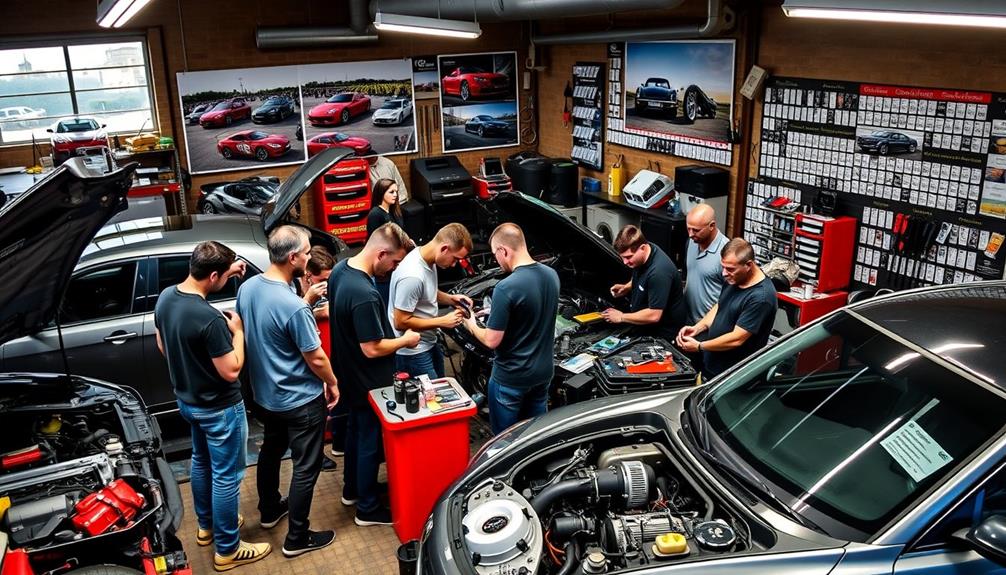
Connecting with fellow enthusiasts and professionals in the car tuning community can greatly boost your journey as a tuner. By building a strong network, you can gain valuable experience, insights, and opportunities that can propel your tuning career forward. Here are some effective ways to connect:
| Method | Benefits | Tips |
|---|---|---|
| Attend Local Events | Meet experienced tuners | Bring your projects to share |
| Join Online Forums | Exchange knowledge and advice | Be active and ask questions |
| Volunteer at Tuning Shops | Hands-on experience | Build rapport with established tuners |
| Engage on Social Media | Share projects and network | Use relevant hashtags and tag others |
Participating in local car meets, tuning events, and racetracks allows you to foster relationships and find potential mentors. Online forums and social media groups are great for staying updated on industry trends and sharing your journey. Additionally, leverage networking platforms like LinkedIn to showcase your passion and skills. By actively engaging in the community, you'll enhance your visibility, making it easier to connect with like-minded individuals who share your enthusiasm for tuning.
Starting a Tuning Business
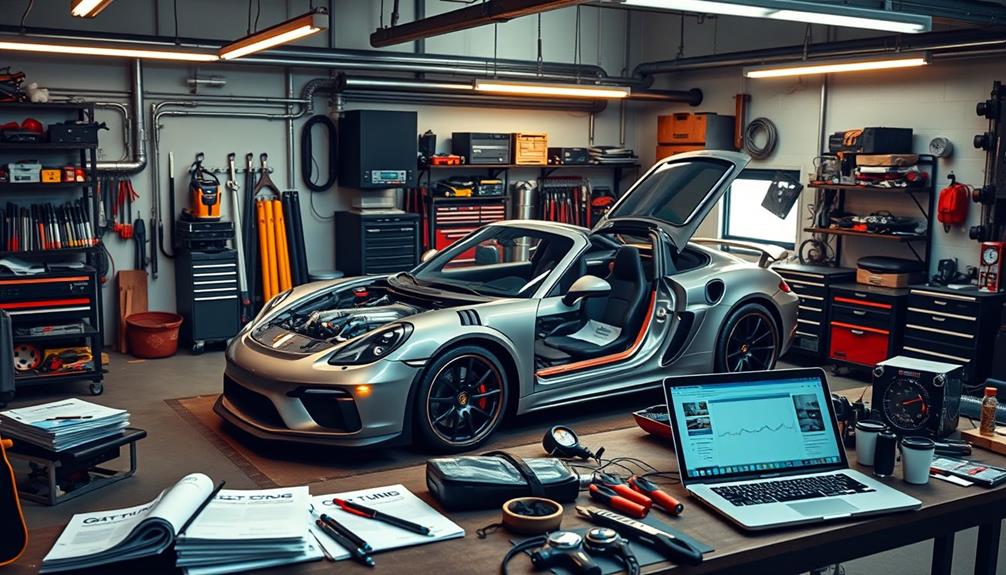
Starting your own tuning business can be an exciting venture that allows you to turn your passion into profit. Before diving in, research local market conditions to assess the demand for tuning services in your area. Gaining hands-on experience at established tuning shops will help you understand industry standards and best practices.
Next, develop a thorough business plan that outlines your goals and includes key aspects like financial projections, insurance needs, and compliance with zoning laws and local regulations. This plan will be your roadmap as you navigate the initial stages of your business.
Consider starting small by offering your services to friends or local enthusiasts. This approach lets you build a reputable portfolio while gaining valuable experience.
Additionally, network with local car clubs and attend automotive events to build relationships within the tuning community. These connections can lead to valuable referrals and business opportunities.
Engine and Suspension Modifications
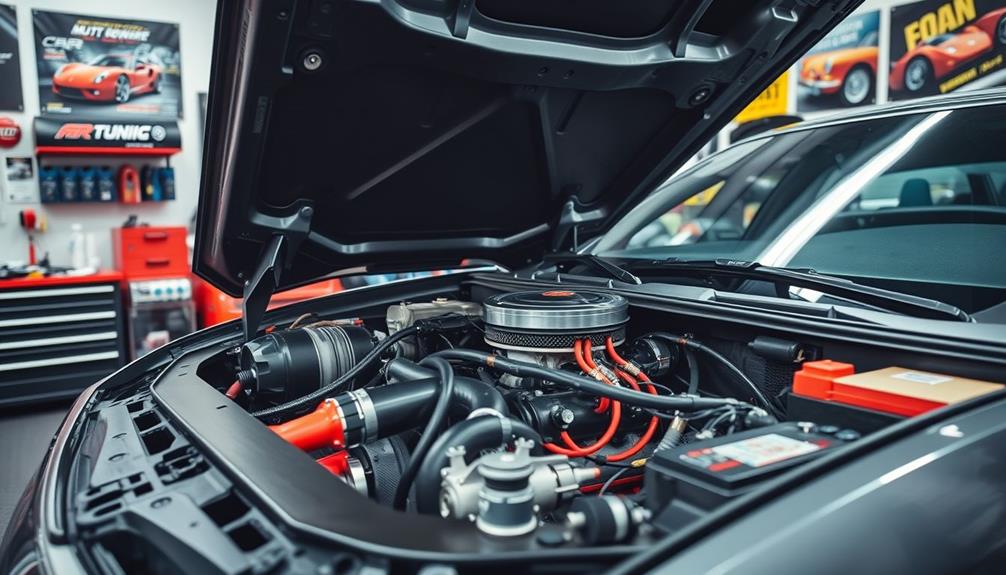
When it comes to boosting your car's performance, engine tuning techniques like turbocharging and chip tuning can make a noticeable difference.
At the same time, suspension enhancements can improve your vehicle's handling and stability, giving you a sportier feel on the road.
Just remember to stay informed about legal compliance considerations to guarantee your modifications keep you within the law.
Engine Tuning Techniques
Engine tuning techniques are fundamental for releasing your vehicle's full potential, enhancing both power and efficiency. One of the most effective methods is ECU remapping, which allows you to adjust engine parameters for peak performance. This process can improve your vehicle's responsiveness and overall power output, especially when combined with turbocharging, which increases air intake.
Additionally, considering top-rated heat pumps can provide insights into maximizing efficiency in other areas of your life, similar to how tuning improves vehicle performance.
Fine-tuning the air-fuel ratio is another essential aspect of engine tuning. By optimizing this ratio, you can guarantee that your engine runs efficiently, reducing fuel consumption and emissions. Proper ignition timing and fuel delivery systems also play significant roles in maximizing engine performance.
Don't overlook the importance of fuel injectors, as they help maintain the right balance for your engine to operate at its best.
Before diving into modifications, it's critical to understand the legal implications of tuning. Compliance with emissions standards is important to avoid potential fines and guarantee your vehicle remains roadworthy.
Using a dynamometer (dyno) can help you measure horsepower and torque before and after modifications, allowing you to evaluate performance improvements accurately. With these techniques, you're well on your way to becoming a skilled tuner.
Suspension Enhancement Methods
Suspension enhancement methods play an essential role in improving your vehicle's handling and ride quality. Lowering your vehicle using lowering springs can greatly boost stability by lowering the center of gravity, allowing for sharper cornering and better overall control.
Engaging in these modifications requires a level of creativity similar to that found in design thinking processes, where iterative testing and user feedback can lead to ideal solutions. If you want more versatility, consider installing adjustable coilovers, which let you fine-tune both ride height and damping settings for various driving conditions.
Upgrading to sports suspensions is another great option. This typically involves replacing factory components with stiffer springs and shock absorbers, providing a firmer ride and enhanced cornering capabilities.
To further reduce body roll during cornering, adding sway bars (anti-roll bars) can dramatically improve your car's handling dynamics.
You might also want to implement strut braces and chassis stiffeners. These additions increase your vehicle's structural rigidity, leading to improved steering response and reduced flex, especially during aggressive driving.
Legal Compliance Considerations
Maneuvering through the legal landscape of car modifications is essential for any tuner. Understanding local regulations is significant since specific engine and suspension modifications may be prohibited on public roads, leading to fines if you're not compliant. In Germany, for instance, modifications must meet the General Operating Permit (ABE) requirements, guaranteeing parts are certified and documented.
Moreover, many regions enforce noise ordinances, limiting exhaust system decibel levels. To avoid legal issues, consider expert inspections to verify compliance with these laws. Keeping detailed records of all modifications is crucial, as insurance companies often require proof of compliance and documentation for claims related to tuned vehicles.
Here's a simplified overview of key compliance factors:
| Compliance Factor | Importance |
|---|---|
| Local Regulations | Avoid fines and penalties |
| General Operating Permit | Required for parts certification |
| Noise Ordinances | Prevent legal disputes |
| Documentation | Essential for insurance claims |
| Expert Consultation | Navigate legal complexities |
Before you engage in modifications, consult with experienced professionals to understand the intricacies of legal compliance and minimize potential liabilities.
Aesthetic Enhancements and Components

When you think about enhancing your car's aesthetic appeal, the possibilities are nearly endless. You can start with aesthetic enhancements like upgrading your rims and tires. Opt for lightweight aluminum rims that improve both performance and appearance. Modifying your exhaust system can also elevate your car's look while boosting horsepower by optimizing exhaust flow.
Lighting customization is another exciting avenue. Using LED technology, you can transform your headlights and turn signals, enhancing both style and safety. Just make certain your modifications comply with local regulations to avoid any issues.
Body tuning is vital for achieving a standout appearance. Adding components like spoilers and side skirts can improve aerodynamics while giving your car a unique flair. A custom paint job can tie everything together, making your vehicle truly one-of-a-kind.
However, remember that legal compliance is essential. Changes to your rims, exhaust systems, and lighting must adhere to local laws to guarantee your car remains roadworthy.
Legal Considerations in Tuning
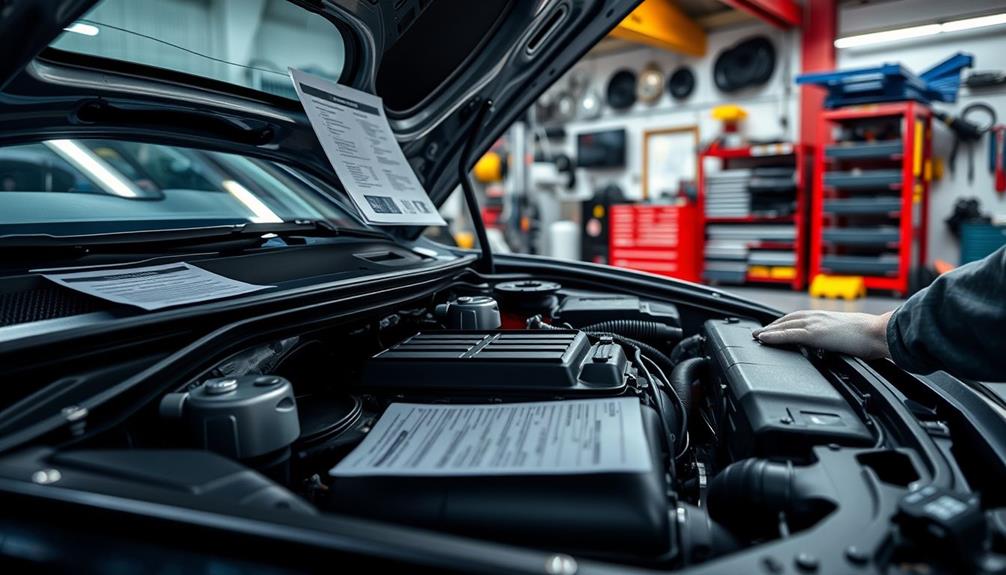
Before diving into car tuning, it's important to grasp the legal landscape that surrounds vehicle modifications. Understanding local regulations is imperative since illegal alterations can lead to fines and penalties. The legality of car tuning varies greatly by jurisdiction, so you'll need to research specific laws related to emissions, noise levels, and safety standards.
Many regions require that modifications comply with road traffic laws. Some parts may even need an ABE (General Operating Permit) to be legally installed on public roads. Legal restrictions often apply to specific modifications, such as exhaust systems or body kits, so it's important to verify that all changes meet the required legal standards.
To guarantee compliance, consider seeking expert inspections, especially when making considerable performance-enhancing modifications. These professionals can help identify any potential legal pitfalls and guide you in making safe and legal modifications.
Career Opportunities in Tuning
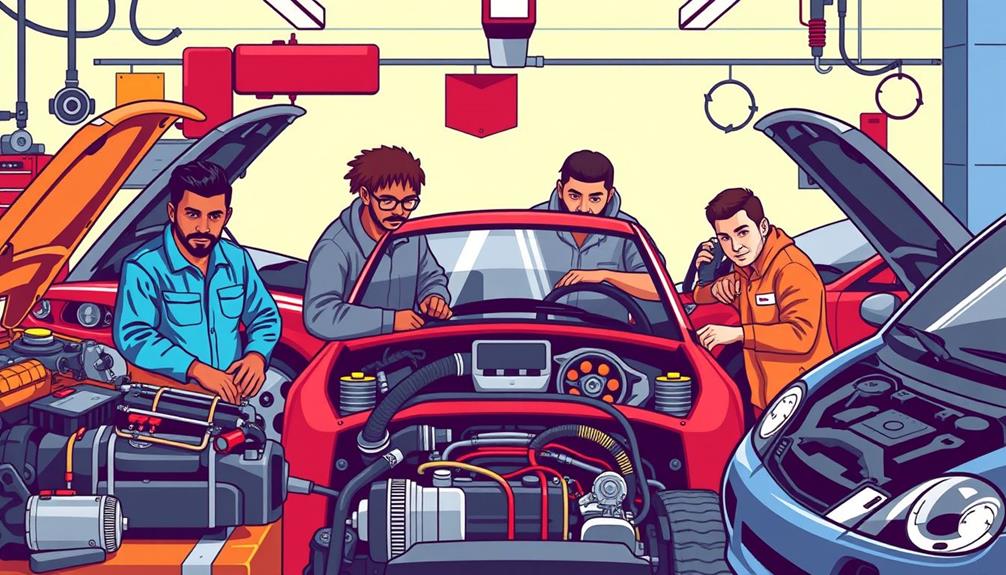
Having a solid understanding of the legal aspects of car tuning can open doors to various career opportunities in the industry.
While there aren't globally accredited qualifications for professional tuning, gaining practical experience through hands-on projects and assisting local tuning shops can greatly enhance your skills and employability.
Many successful tuners shift from hobbyists to professionals by building a strong portfolio, tuning for friends, and participating in community events.
Networking is critical in the tuning industry. Opportunities often arise from connections made at racetracks, car meets, and tuning workshops.
Attend these events, and don't hesitate to introduce yourself and share your passion.
Continuous learning is essential for staying updated on the latest tuning techniques and technologies.
Consider enrolling in online courses or reading industry literature—over 30,000 individuals have switched careers through these resources.
Frequently Asked Questions
How to Become a Professional Engine Tuner?
To become a professional engine tuner, you should gain hands-on experience, learn tuning techniques, enroll in relevant courses, network with industry professionals, and regularly engage in practical projects to deepen your understanding and skills.
Do Car Tuners Make Good Money?
You might think car tuners don't earn much, but many actually make between $40,000 and $100,000 annually. With experience and a solid reputation, you can charge up to $150 per hour for your expertise.
Can You Teach Yourself to Tune Cars?
Yes, you can teach yourself to tune cars. Utilize online courses, engage in DIY projects, and connect with local car clubs. Practical experience and networking will enhance your skills and deepen your understanding of tuning principles.
Is It Hard to Be a Car Tuner?
It might seem hard to become a car tuner, but with hands-on experience and continuous learning, you'll find it rewarding. Embrace challenges, connect with others, and your skills will grow faster than you think.
Conclusion
Diving into the dynamic world of car tuning can transform your passion into a profession. By blending hands-on experience with educational insights, you'll build a robust foundation. Don't forget to foster friendships within the community, as connections can catalyze your career. Whether you're enhancing engines or elevating aesthetics, staying savvy about regulations is key. With dedication and drive, you can shift from hobbyist to high-flying tuner, turning dreams into dazzling realities on the road!
